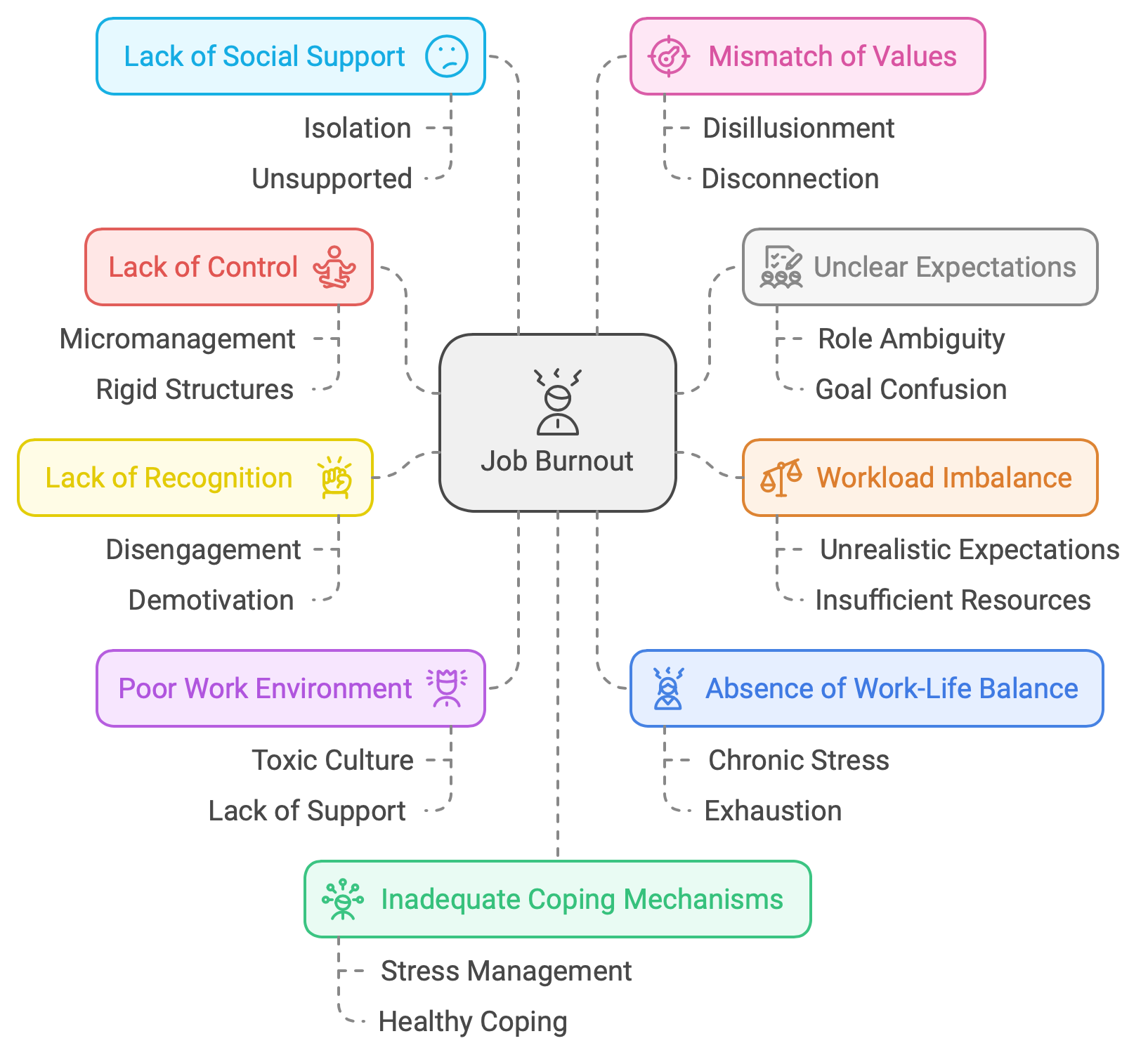Do You Know What is the Biggest Myth about an Employee Burnout?
Job burnout is a complex and multifaceted phenomenon that goes beyond the simple attribution to excessive overtime. While long hours and heavy workloads can indeed contribute significantly, the roots of burnout delve deeper into various interconnected factors that collectively impact an individual's mental, emotional, and physical well-being within a work environment.

Read our complete guide about HR Team role in Preventing Employees Burn Out - Guide: HR’s Role in Team Management and Preventing Burnout
Here are some key elements that contribute to job burnout:
Here are some key elements that contribute to job burnout:
1. Lack of Control:
Feeling powerless or lacking autonomy in decision-making processes can lead to burnout. When individuals feel constrained by rigid structures or micromanagement, it can erode their sense of agency and contribution.
2. Unclear Expectations:
Ambiguity in roles, responsibilities, or goals can lead to confusion and stress. Lack of clarity in what's expected often results in increased pressure and anxiety.
3. Workload Imbalance:
It's not just about the amount of work but also the balance between the demands of the job and the resources available. Constantly feeling overwhelmed due to unrealistic expectations or insufficient resources can foster burnout.
4. Lack of Recognition and Reward:
When hard work goes unnoticed or unappreciated, it can lead to feelings of disengagement and demotivation. Recognition and reward systems are crucial in maintaining morale and preventing burnout.
5. Poor Work Environment:
Toxic workplace cultures, conflicts with colleagues or superiors, and a lack of support systems contribute significantly to burnout. A negative atmosphere can drain one's energy and enthusiasm.
6. Absence of Work-Life Balance:
Blurring the boundaries between work and personal life can lead to chronic stress. In an 'always-on' culture, individuals struggle to disconnect, leading to exhaustion and burnout.
7. Lack of Social Support:
Feeling isolated or unsupported in the workplace amplifies stress levels. Strong social connections at work can act as a buffer against burnout.
8. Mismatch of Values:
Misalignment between personal values and organizational goals can create a sense of disillusionment, making individuals feel disconnected from their work's purpose.
9. Inadequate Coping Mechanisms:
Not having effective strategies to manage stress can exacerbate burnout. Individuals need healthy coping mechanisms to navigate challenging situations.
10. Continuous High-Stress Situations:
Prolonged exposure to stressful conditions without adequate periods of recovery can lead to burnout. Lack of breaks or vacations can exacerbate the situation.

Understanding that burnout is a result of various interacting factors helps organizations and individuals take proactive measures to address and prevent it. Employers can promote a healthy work environment by fostering open communication, providing adequate resources, recognizing achievements, and prioritizing work-life balance. Meanwhile, individuals can take charge of their well-being by setting boundaries, seeking support, practicing self-care, and maintaining a healthy balance in their lives.
Burnout is not just a personal issue but a strategic business challenge that, if unaddressed, can impact overall performance. Companies need to view burnout prevention as an essential component of their growth strategy.
I would like to recommend you several related articles:
Leaders can burn out too! Read Our Article about How to Deal with Leadership Burn Out in Your Organization
Changing jobs can be frustrating - How to make a breakthrough and avoid burn out while changing workplace
Are you facing burnout challenges in your workplace?
Contact us today for expert People Strategy Consulting to create a healthier, more resilient team environment. Let’s work together to optimize your processes and enhance employee well-being!
I would like to recommend you several related articles:
Leaders can burn out too! Read Our Article about How to Deal with Leadership Burn Out in Your Organization
Changing jobs can be frustrating - How to make a breakthrough and avoid burn out while changing workplace
Are you facing burnout challenges in your workplace?
Contact us today for expert People Strategy Consulting to create a healthier, more resilient team environment. Let’s work together to optimize your processes and enhance employee well-being!








